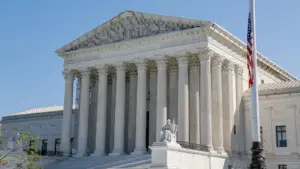As the Supreme Court prepares to hear a landmark case regarding public funding for religious charter schools, advocates for educational reform see a potential turning point for religious freedom in American education, thanks to Donald Trump's judicial legacy.
The Future of Religious Education: Supreme Court Case Could Shift Paradigms

The Future of Religious Education: Supreme Court Case Could Shift Paradigms
A pivotal Supreme Court case may redefine the landscape of education in America by allowing religious charter schools to receive public funding, following the Trump-era judicial appointments.
A significant shift in the education system may soon emerge, rooted in President Donald Trump’s transformative impact on the U.S. Supreme Court. This year’s agenda includes a contentious case that could pave the way for publicly funded religious charter schools, thereby challenging the government’s long-standing dominance over secular educational frameworks. The case—which originated from Oklahoma on behalf of the St. Isidore of Seville Catholic Virtual School—places the state at odds with a coalition of activist groups and Biden-aligned officials, all arguing that public funding for a religious entity breaches the Constitution.
For conservatives and advocates of religious freedom, the case presents a crucial opportunity, a direct reflection of Trump’s trio of appointments to the nation’s highest court. Legal experts assert that had previous court majorities been in place, this case might not have even been entertained. However, with a pro-constitutionalist 6–3 majority now, the Supreme Court is showing a readiness to reevaluate antiquated legal interpretations that have historically barred faith-based institutions from equivalent treatment within public domains.
St. Isidore operates fully online as a Catholic charter school aiming to provide an education steeped in values while adhering to all academic requirements of Oklahoma charter schools. Approved by the state’s virtual charter board in 2023 under Republican Governor Kevin Stitt, the school quickly faced challenges through lawsuits attempting to halt its operations. Opponents, supported by progressive legal organizations, argue that funding a religious school undermines the principle of separation between church and state. Nevertheless, a recent ruling from the Supreme Court in the Espinoza v. Montana Department of Revenue case (2020) determined that states could not discriminate against religious schools solely on the basis of their religious nature.
Justices Gorsuch, Kavanaugh, and Barrett—appointed by Trump—were instrumental in that decision and are once again expected to influence this particular case significantly. Legal analysts speculate that this upcoming ruling could affirm that religious schools possess equal rights in participating in charter programs, particularly considering that enrollment in these schools is voluntary and they meet necessary educational standards.
Conservative legislators are already forecasting this case as a hallmark moment. Representative Mark Green (R-TN) commented, “For decades, our education system has excluded faith from the classroom under the false guise of neutrality. This case could finally restore parental choice and ensure fairness in the system.”
The Biden administration, responding to secularist lobbying, has taken a muted stance against this initiative, advocating for rigid separation between public funds and faith-based organizations. Yet, there is a burgeoning grassroots movement in favor of religious charter schools, notably among minority demographics who feel underserved by a failing public education system and are enthusiastic about options that incorporate moral values.
Trump has long championed the doctrines of school choice and religious liberty, and his judicial imprint may soon yield one of its most significant cultural milestones—reinstating faith's validity in American education and empowering families to select schools that align with their personal values.





















